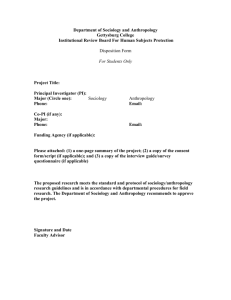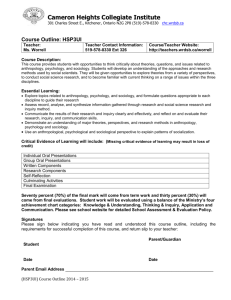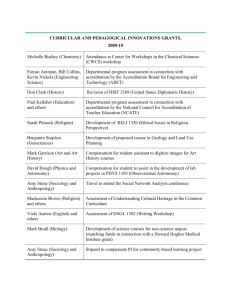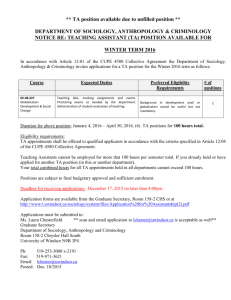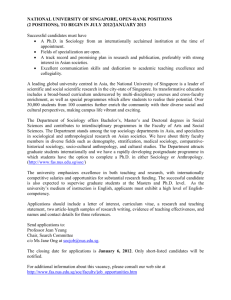Introduction to Anthropology and Sociology
advertisement
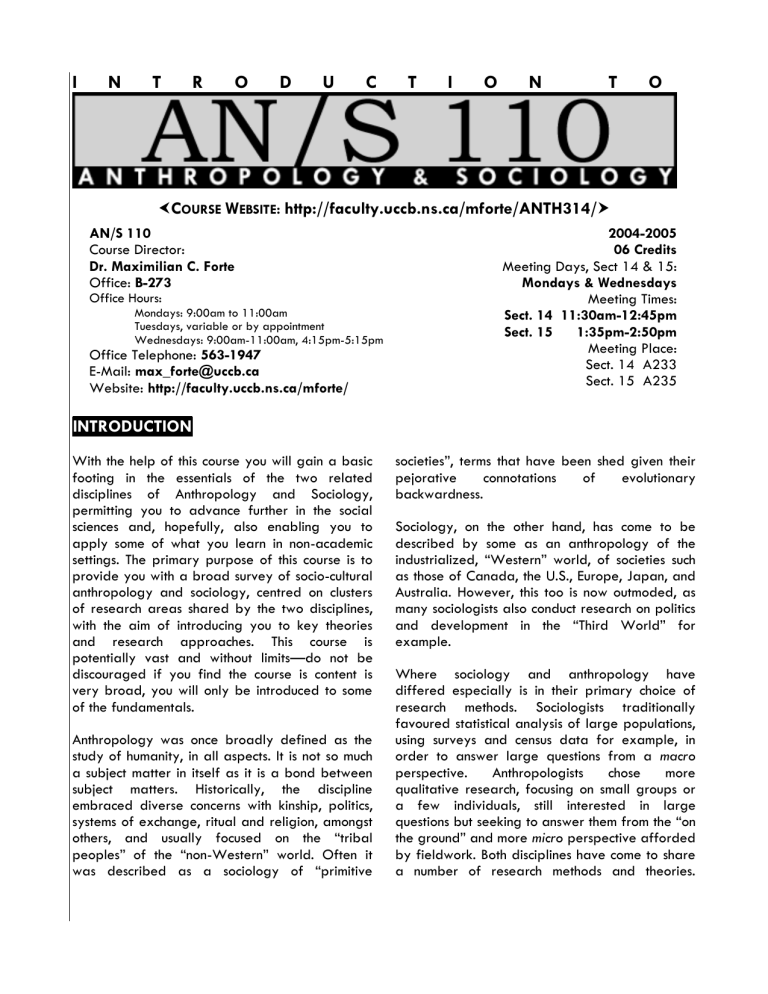
I N T R O D U C T I O N T O COURSE WEBSITE: http://faculty.uccb.ns.ca/mforte/ANTH314/ AN/S 110 Course Director: Dr. Maximilian C. Forte Office: B-273 Office Hours: Mondays: 9:00am to 11:00am Tuesdays, variable or by appointment Wednesdays: 9:00am-11:00am, 4:15pm-5:15pm Office Telephone: 563-1947 E-Mail: max_forte@uccb.ca Website: http://faculty.uccb.ns.ca/mforte/ 2004-2005 06 Credits Meeting Days, Sect 14 & 15: Mondays & Wednesdays Meeting Times: Sect. 14 11:30am-12:45pm Sect. 15 1:35pm-2:50pm Meeting Place: Sect. 14 A233 Sect. 15 A235 INTRODUCTION With the help of this course you will gain a basic footing in the essentials of the two related disciplines of Anthropology and Sociology, permitting you to advance further in the social sciences and, hopefully, also enabling you to apply some of what you learn in non-academic settings. The primary purpose of this course is to provide you with a broad survey of socio-cultural anthropology and sociology, centred on clusters of research areas shared by the two disciplines, with the aim of introducing you to key theories and research approaches. This course is potentially vast and without limits—do not be discouraged if you find the course is content is very broad, you will only be introduced to some of the fundamentals. Anthropology was once broadly defined as the study of humanity, in all aspects. It is not so much a subject matter in itself as it is a bond between subject matters. Historically, the discipline embraced diverse concerns with kinship, politics, systems of exchange, ritual and religion, amongst others, and usually focused on the “tribal peoples” of the “non-Western” world. Often it was described as a sociology of “primitive societies”, terms that have been shed given their pejorative connotations of evolutionary backwardness. Sociology, on the other hand, has come to be described by some as an anthropology of the industrialized, “Western” world, of societies such as those of Canada, the U.S., Europe, Japan, and Australia. However, this too is now outmoded, as many sociologists also conduct research on politics and development in the “Third World” for example. Where sociology and anthropology have differed especially is in their primary choice of research methods. Sociologists traditionally favoured statistical analysis of large populations, using surveys and census data for example, in order to answer large questions from a macro perspective. Anthropologists chose more qualitative research, focusing on small groups or a few individuals, still interested in large questions but seeking to answer them from the “on the ground” and more micro perspective afforded by fieldwork. Both disciplines have come to share a number of research methods and theories. AN/S 110 – Introduction to Anthropology and Sociology – Max Forte – 2004-2005 2 PRIMARY COURSE QUESTIONS AND PROBLEMS: At different stages of the course students should be able to formulate substantive replies to the main course questions listed below. 1. What is the subject matter of anthropology 5. How do “cultures” develop and change? Is and sociology? How did these disciplines “culture” the same thing as “race”, develop? How are they similar and “ethnicity” and “nationality”? different? How would you compare and 6. What does “race” mean, and does it have contrast these two disciplines and how they anything to do with patterns of behaviour approach similar subjects of interest? or intelligence? 2. What are the research methods that are 7. What is so important about “kinship” and central to each of these two related why does it matter? disciplines? How do they differ? Is one set 8. What determines gender variation and of methods better suited for certain subject gender identification? How do we define matters than others? male and female? Is gender and sexuality 3. What is “society”? What are the means the same thing? and processes involved in “socialization”? 9. What is the social role of families? What does the “social construction of 10. In what ways does religion act as a force reality” mean? of social control, or social change? 4. What is “culture”? How do humans acquire 11. What is the nature of global social “culture”? What is the difference between relations and the current human condition? “society” and “culture”? Some of the main themes structuring or underlying this course can be summarized with the following headings: 1. Evolution, Modernization and Development 2. Universalism and Particularism 3. Sameness and Difference 4. Nature—Culture 5. Symbolism and the arbitrariness of culture 6. The social construction of reality 7. Macro versus Micro 8. Exceptions vs. Generalizations; Opinion versus Fact COURSE GOALS (1) Gain familiarity with the disciplines: The primary aim of this course is for students to gain a broad appreciation of the concepts, analytical approaches, theories and methods of both anthropology and sociology. The course revolves around key topic areas that are shared by both disciplines. In the process, students should begin to gain a deeper and broader perspective on the social world we inhabit and the cultures we shape and which shape us in turn. Being able to grasp the fundamental content necessary for articulating ideas and transforming information into knowledge is absolutely critical—without the content, there can be little in the way of thought. (2) Learn to question: As a student, you will succeed once you begin to question everything you have taken for granted and left unquestioned where the nature of society, human behaviour, and cultural values are concerned. When it comes to social relationships and cultural meanings, the “facts” never speak for themselves. Being able to evaluate arguments, to understand how arguments are structured, and what makes some interpretations less valid and plausible than others, is a major set of skills essential for work in the social sciences. AN/S 110 – Introduction to Anthropology and Sociology – Max Forte – 2004-2005 3 TEXTS AND RELATED COURSE MATERIALS Course Text: For the 2004-2005 academic year, Sections 14 and 15 of AN/S 110, will be using a single text designed specifically for these course sections. That text is: Introduction to Anthropology & Sociology, compiled by Maximilian C. Forte. 2004. Thomson Custom Publishing. Price in bookstore: $106.60 Course Website: I have also designed a website specifically to support students in this course. The glossary, supplemental readings, suggested websites and online tutorials will help you to clarify and focus. For multiple choice exams, the online self-tests will also aid you. Lecture outlines and handouts that you may have missed will also be posted on the site. Sudden class cancellations will be announced on the site. My intention is that you use the website as your guide through this course, rather than this printed syllabus. Remember the URL: http://faculty.uccb.ns.ca/mforte/ANTH314/ AN/S 110 – Introduction to Anthropology and Sociology – Max Forte – 2004-2005 4 THE STRUCTURE OF COURSE PARTICIPATION 1. Lectures and Readings: My lectures are not a substitute for the required readings. My aims as the course director are to supplement, clarify, or apply the required readings. The methods I have chosen for achieving these aims consist of either a question and answer style of class discussion, conducting debates, or simply bringing in other material related to the readings. Do not fall behind in the readings. All reading topics in this course are covered equally in the exams— none of the course content is optional. If you are not diligent in doing all of the required readings, and carefully covering the course content by taking your own notes on the readings, then rest assured that your performance as a student will suffer greatly. Lectures should give you a clear indication of the range of material to be covered and drawn upon from the readings. Discussion questions will help to you focus on the most important content in the readings. You are expected to know the main concepts, the main debates, and some of the most important evidence used to support contending arguments. Kindly note that while I attempt to divide each week into one session for the lecture (usually on Mondays), and one session for discussion (usually on Wednesdays), I may not always be able to divide class time so neatly. In some cases, lectures may spill over into the time allotted for discussions, or may incorporate discussions. It is therefore not a clever idea to plan to miss the discussion sessions if your sole intent is to acquire lecture notes. Lecture notes from a previous version of this course will be largely useless to you. 2. Class Attendance and Participation: Given the large number of students in this course, I will not take formal class attendance. On the other hand, your failure to participate in class discussions, to demonstrate how well you are doing in grasping and applying concepts, showing your ability to engage with the course content, can only serve to limit and downgrade your performance in the course. You must come to class prepared, which means doing all of the required readings on time. 3. Exams: There will be four (4) tests, at the end of each “quarter” of the course. Two of these will be conducted during class time, and two will take place during the examinations periods in December and April. Make up tests will not be available, so please treat each test with the critical importance that it deserves. Given the large number of students, and a single person doing the grading, “extra work” cannot be offered to make up for poor exam preparation. The two in-class exams will be worth 20% of the grade each, and the exams during the December and April examinations periods will be worth 30% of the grade each. Beware: Some students refuse to understand that you must NOT schedule trips or other absences during examinations periods. If you are not present for the exam, your grade for that exam will by necessity be zero and will be factored in to your final grade. The ONLY acceptable reason for missing an exam, and only with formal documentation, is a medical emergency. Kindly re-read this section as many times as it takes to understand that there are no loopholes here. 4. Exam Formats: Exams (both in-class and during exam periods in December and April) will only cover material specific to given parts of the course, rather than the whole course. In-class exams will tend to be in multiple-choice format. Exams in December and April will be in essay format. Essay exams can be very challenging, especially if you have a sense of what is required. Helpful notes and guidelines for preparing for an essay exam are available at: AN/S 110 – Introduction to Anthropology and Sociology – Max Forte – 2004-2005 5 http://infotrac.thomsonlearning.com/infowrite/sp_exams.htm OR http://sundance.heinle.com/reader3e/sp_exams.htm 5. Grades: If and when it is applicable, the grades for this course will be “curved”, and usually I will let the performance of the leading students act as an indication of what may be applicable. I will discuss the available options during our first meetings for this course. In my approach, curved grades do not exist to reward and promote students who fail to carry their own weight—they are meant to limit the potential demoralization of the best students by better reflecting the standard of their performance. Your mid-term grade in December should give you a strong indication of what your final outcome will be for this course, if you continue along the same path. Those who have earned mid-term grades of less than 50%, and especially less than 40%, should meet with me to discuss problems, possible solutions and options. Otherwise, those who work hard for this course, devoting the four to seven hours of study each week that it demands, will find themselves earning very respectable grades. UCCB assigns numerical grades, which can be roughly translated as follows: 90% and above (A+) 85-89% (A) 80-84% (A-) 75-79% (B+) 70-74% (B) 65-69% (C+) 60-64% (C) 50-59% (D) Less than 50% (F) For more information on UCCB policies concerning deferred examinations, postponement of examinations, extraordinary circumstances and supplementary examinations, refer to the current UCCB Calendar, in print, or at: http://www.uccb.ns.ca/main/calendar/fall_calendar_2004_2005_KEV_CONTENTS.htm AN/S 110 – Introduction to Anthropology and Sociology – Max Forte – 2004-2005 6 SCHEDULE OF MEETINGS AND ASSIGNED READINGS [see “Online Syllabus” on the course website for a more in-depth range of readings and tutorials] FALL SEMESTER, 2004 PART ONE: INTRODUCING ANTHROPOLOGY AND SOCIOLOGY When did these two disciplines emerge, and why? What makes them different, yet increasingly similar? In which ways do they overlap? Week 1 Mon. 13 Sept: Introduction to the Course Weds. 15 Sept: Lecture: Introducing Anthropology Reading: Ch. 1, Anthropology and Human Diversity, pps. 1-18 19 Sept: FINAL DATE TO REGISTER FOR OR ADD A COURSE FOR FALL TERM Week 2 Introducing Sociology Mon. 20 Sept. &Weds. 22 Sept. Reading: Ch. 2, A Sociological Compass, pps. 19-46 PART TWO: THINKING ABOUT THE WAYS WE THINK We often take our very thought processes for granted. Too often we rely on what we believe to be “common sense”, old truisms, our buy arguments at face value. Some might think that social scientific arguments are merely opinion, and because everyone has a right to an opinion, all opinions are equally valid. Now we will find out why this is all wrong. Week 3 Analysing and Evaluating Arguments Mon. 27 Sept. & Weds. 29 Sept. Reading: Ch. 3, The Anatomy of Arguments: Identifying Premises and Conclusions, pps. 47-74 Week 4 Generalizations and Exceptions Mon. 4 Oct. & Weds. 6 Oct. Reading: Ch. 4, Should We Generalize about People? pps. 75-82 AN/S 110 – Introduction to Anthropology and Sociology – Max Forte – 2004-2005 7 PART THREE: INTRODUCING THEORIES IN ANTHROPOLOGY AND SOCIOLOGY Given the broad range of subjects covered by anthropology and sociology, there are a great many theories that have been developed to explain a wide array of human behaviour. Here we will learn of some of the classic and widely disseminated theories at the core of these two disciplines. Week 5 Mon. 11 Oct. (Thanksgiving, Closed) Weds. 13 Oct: Introducing Theories in Anthropology Readings: Ch. 5, Appendix, pps. 83-90 Ch. 6, The Development of Anthropological Thought, pps. 91-108 Week 6 Introducing Theories in Sociology Mon. 18 Oct. & Weds. 20 Oct. Reading: Ch. 7, Three Sociological Perspectives, pps. 109-118 MON. 25 OCTOBER 2004: IN-CLASS EXAM FOR PARTS ONE, TWO and THREE (20% of final grade) PART FOUR: METHODS IN SOCIAL AND CULTURAL RESEARCH Armchair theorizing is no longer accepted in the social sciences. Claims to truth have to be based on some foundation of supporting evidence—information that can be acquired by others using the same methods of investigation (at least, this is one approach to knowledge in the social sciences). Here we will obtain an overview of some of the primary research methods used by anthropologists and sociologists. We will compare and contrast them and discuss which methods may be more appropriate given different research subjects. Week 7 Mon. 25 Oct. (EXAM, see above) Weds. 27 Oct: Research in Social-Cultural Anthropology Reading: Ch. 8, Methods of Investigation, pps. 119-134 Week 8 Research Methods in Sociology Mon. 1 Nov. & Weds. 3 Nov. Reading: Ch. 9, Doing Sociological Research, pps. 135-159 AN/S 110 – Introduction to Anthropology and Sociology – Max Forte – 2004-2005 8 PART FIVE: CULTURE AND SOCIETY, ENCULTURATION AND SOCIALIZATION, SOCIAL CONTROL AND DEVIANCE Social scientists have handled populations through large categories such as “society” and “culture”. We as individuals have been schooled in the ways of our societies and instructed as to the appropriate cultural norms governing social relationships. To a significant extent, we are also speaking of patterns and processes of social control here, as well as the ways that societies reproduce themselves. Institutions and norms governing socialization are thus focal concerns of this part. We are concerning ourselves with some of the larger, overarching institutions and values that mould individuals into particular social and cultural relationships and frameworks of meaning. Week 9 Culture and Society: key concepts Mon. 8 Nov. & Weds. 10 Nov. Reading: Ch. 10, Culture and Society, pps. 163-192 Week 10 Socialization and the Learning of Culture Mon. 15 Nov. & Weds. 17 Nov. Readings: Ch. 11, Socialization, pps. 193-220 Ch. 12, Learning Culture, pps. 221-240 Week 11 Social Control Mon. 22 Nov. & Weds. 29 Nov. Reading: Ch. 13, Social Control, pps. 241-262 Week 12 Deviance Mon. 29 Nov. & Weds. 1 Dec. Reading: Ch. 14, Deviance and Crime, pps. 263-290 EXAMINATIONS: 6-17 December EXAM FOR PARTS FOUR AND FIVE, during examinations period (30% of final grade) Dec. 23: Fall grades accessible online Please Note: You do have some work to do over the Winter holiday break (you should start getting accustomed to this fact), and it merely consists of doing the assigned readings for the start of class in January. If you are particularly enterprising, you will take the opportunity to read ahead on your own. AN/S 110 – Introduction to Anthropology and Sociology – Max Forte – 2004-2005 9 WINTER SEMESTER, 2005 PART SIX: CULTURE, COMMUNITY AND FAMILY We have studied how concepts such as culture and society can aid us to develop theories of socialization and enculturation that underpin social order, social control and social reproduction. We are still concerned with how individuals are schooled in various social and cultural norms, through particular institutional vehicles, such as the family, systems of kinship, ethnic organizations, gender relations, religion, and even language. These topics will be our focus for this section. Week 13 Mon. 3 Jan. (Closed, classes begin on 4 Jan) Weds. 5 Jan: Language & Culture: an ambiguous relationship Readings: Ch. 15, Culture, pps. 291-314 Ch. 16, Language, pps. 315-342 Week 14 Religion in Anthropology and Sociology Mon. 10 Jan. & Weds. 12 Jan. Readings: Ch. 17, Religion, pps. 343-370 Ch. 18, The Sociological Perspective on Religion, pps. 371-394 Week 15 Race or Ethnicity? Mon. 17 Jan. & Weds. 19 Jan. Reading: Ch. 19, Race and Ethnicity, pps. 395-428 Week 16 Gender Relations Mon. 24 Jan. & Weds. 26 Jan. Reading: Ch. 20, Gender in Comparative Perspective, pps. 429-454 28 Jan: FINAL DATE TO WITHDRAW FROM A FULL-YEAR (6 CREDIT) COURSE WITHOUT ACADEMIC PENALTY. Week 17 Kinship Systems Mon. 31 Jan. & Weds. 2 Feb. Reading: Ch. 21, Kinship, pps. 455-476 Week 18 Families Mon. 7 Feb. & Weds. 9 Feb. Reading: Ch. 22, The Family, pps. 477-506 AN/S 110 – Introduction to Anthropology and Sociology – Max Forte – 2004-2005 10 Week 19 Mon. 14 Feb. (Reading Week - Closed) Weds. 16 Feb. (Reading Week - Closed) You will most likely use this time to study for the next exam. However, you should also use the time afforded by Reading Week to read ahead in the syllabus. MON. 21 FEBRUARY 2005: IN-CLASS EXAM FOR PART SIX (20% of final grade) PART SEVEN: POWER, POLITICAL ECONOMY AND INEQUALITY Societies are structured to meet certain material or economic ends and there are definite social and political relations accompanying such patterns of production. We will therefore look at patterns of work in different societies, the cultural values associated with work, as well as political systems and social stratification. We will then examine production, power and inequality on a global scale. Our interest in the latter we lead us to focus on colonialism and its legacy in the so-called “Third World”, the emergence of what some call a modern world system that is capitalist and global in extent, and the transnational linkages formed between and among peoples. Week 20 Mon. 21 Feb. (EXAM, see above) Weds. 23 Feb: Introducing Social Inequality/Stratification Readings: Ch. 23, Concepts and Theories of Stratification, pps. 507-528 Ch. 24, Who Rules America? The Corporate Community and the Upper Class, pps. 529-534 Week 21 Understanding Social Stratification Mon. 28 Feb. & Weds. 2 Mar. Reading: Ch. 25, Social Inequality and Stratification, pps. 535-550 Week 22 Production, Distribution and Exchange Mon. 7 Mar. & Weds. 9 Mar. Reading: Ch. 26, Economics, pps. 551-576 Week 23 Political Organization Mon. 14 Mar. & Weds. 16 Mar. Reading: Ch. 27, The Organization of Political Life, pps. 577-594 Week 24 Colonialism, Globalization and World Poverty Mon. 21 Mar. & Weds. 23 Mar. AN/S 110 – Introduction to Anthropology and Sociology – Max Forte – 2004-2005 Readings: Ch. 28, Cultural Change, pps. 595-622 Ch. 29, Global Stratification, pps. 623-648 Week 25 Mon. 28 Mar. (Easter Monday - Closed) Weds. 30 Mar: Non-Western Critiques of Progress and Development Reading: Ch. 30, Nature, Culture, and Development, pps. 649-end. EXAMINATIONS: 4-15 April EXAM FOR PART SEVEN, during examinations period (30% of final grade) 29 April: Final grades accessible online. Congratulations! You have made it to the very end. Thank you for taking this course. I hope to see you again…in another course. 11

